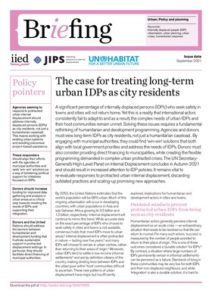 This briefing draws consolidates the key messages from the joint efforts by the International Institute for Environment and Development, UN-Habitat and JIPS, in 2020-2021, that fed extensively into the work and final recommendations of the UN Secretary-General’s High-Level Panel on Internal Displacement (UN-HLP).
This briefing draws consolidates the key messages from the joint efforts by the International Institute for Environment and Development, UN-Habitat and JIPS, in 2020-2021, that fed extensively into the work and final recommendations of the UN Secretary-General’s High-Level Panel on Internal Displacement (UN-HLP).
It draws attention to the fact that “a significant percentage of internally displaced persons (IDPs) who seek safety in towns and cities will not return home. Yet this is a reality that international actors consistently fail to adapt to and as a result, the complex needs of urban IDPs and their host communities remain unmet.” The briefing reiterates the joint call by JIPS, IIED and UN-Habitat for a fundamental rethinking of humanitarian and development programming in order to solve these issues, by re-evaluating responses to protracted urban internal displacement, discarding outdated practices, and scaling-up promising new approaches.
Specifically, “agencies and donors must view long-term IDPs as city residents, not just a humanitarian caseload. By engaging with municipal authorities, they could find ‘win-win’ solutions that both align with local government priorities and address the needs of IDPs. Donors must also consider providing direct financing to municipalities, while creating the flexible programming demanded in complex urban protracted crises.”
—
How to cite:
Earle, L., Ward, C. (2021). The case for treating long-term urban IDPs as city residents. IIED, London. https://pubs.iied.org/20431IIED